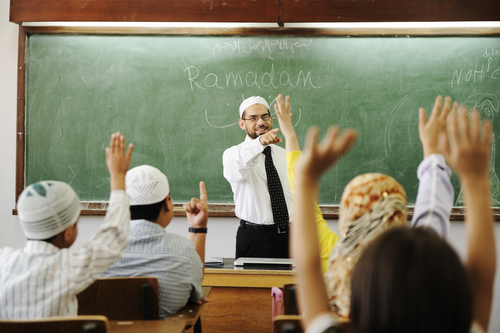What Are the Foundations for Building Islamic Character for Children?
Answered by Shaykh Dr. Muhammad Fayez Awad
Question
What are the foundations for building Islamic character for children?
Answer
- Learn and memorize parts of the Quran and Sunna
- Master the Arabic language and a foreign language
- Choose for them a good teacher and a good school
- And to narrate to them the childhood of past scholars in their quest for knowledge in front of children, like Sufyan ibn Uyaynah, Malik ibn Anas, Imam Shafi’i, Imam Ahmad ibn Hanbal, and Imam Ibn al-Jawzi
The importance of supplication for the rectitude of children is why prophets and righteous people were keen on it. Abraham, Allah give him peace, said: “My Lord! Bless me with righteous offspring.” [Quran 37:100]; and he said: “My Lord! Make me and those ˹believers˺ of my descendants keep up prayer. Our Lord! Accept my prayers.” [Quran 14:40].
And here is Zechariah, Allah give him peace, asking Allah for a righteous offspring “So grant me, by Your grace, an heir, who will inherit ˹prophethood˺ from me and the family of Jacob, and make him, O Lord, pleasing ˹to You˺!” [Quran, 19: 5, 6].
The Prophet Muhammad (Allah bless him and give him peace) said: “Instruct your children to perform prayer when they are seven years old, and spank them [for not performing it] when they are ten, and separate them in their beds.” [Abu Dawud]
Similarly, they should be made accustomed to fasting before puberty if they are able to endure it, as the companions of the Prophet would do with their children, making them fast, and if one of them cried, they would give him a toy to distract him. [Bukhari, Muslim]
And so with the rest of the acts of worship, we accustom them to it, so when they grow up, it becomes easy for them to perform and preserve.
The Prophet Muhammad (Allah bless him and give him peace) said: “The example of a good companion and a bad one is like that of the perfume seller and the blacksmith. The perfume seller might give you some perfume, you might buy from him, or you might simply enjoy the fragrance, whereas the blacksmith might burn your clothes, or you might get an unpleasant smell from him.”
Engaging with them, participating in their games and interests, and praising their positive aspects, whether acquired traits like honesty, trustworthiness, and modesty, for example, or even physical attributes like strength in a young man or beauty in a girl, is crucial because humans naturally love those who care for them.
If children do not find this attention from their parents, they may seek it elsewhere from those who do not fear God, exploiting the deficiency they have in this aspect, and this could lead to their deviance.
This good upbringing will yield prayers for the parents in their life, and it will not cease after their death. The Prophet (Allah bless him and give him peace) said: “When a person dies, all their deeds come to an end except for three: a continuing charity, beneficial knowledge, or a righteous child who prays for them.” [Muslim]
As for others who were not raised upon obedience to Allah, they are often found to be envious, their problems never cease, and they tear each other apart. How many incidents occur between siblings that lead to insults and curses, to abandonment and severance, to hatred and animosity, and to murder and crimes. We ask Allah for safety.
This multiplies the reward for everyone who plants a good seed, and Allah does not waste the reward of those who do good.
